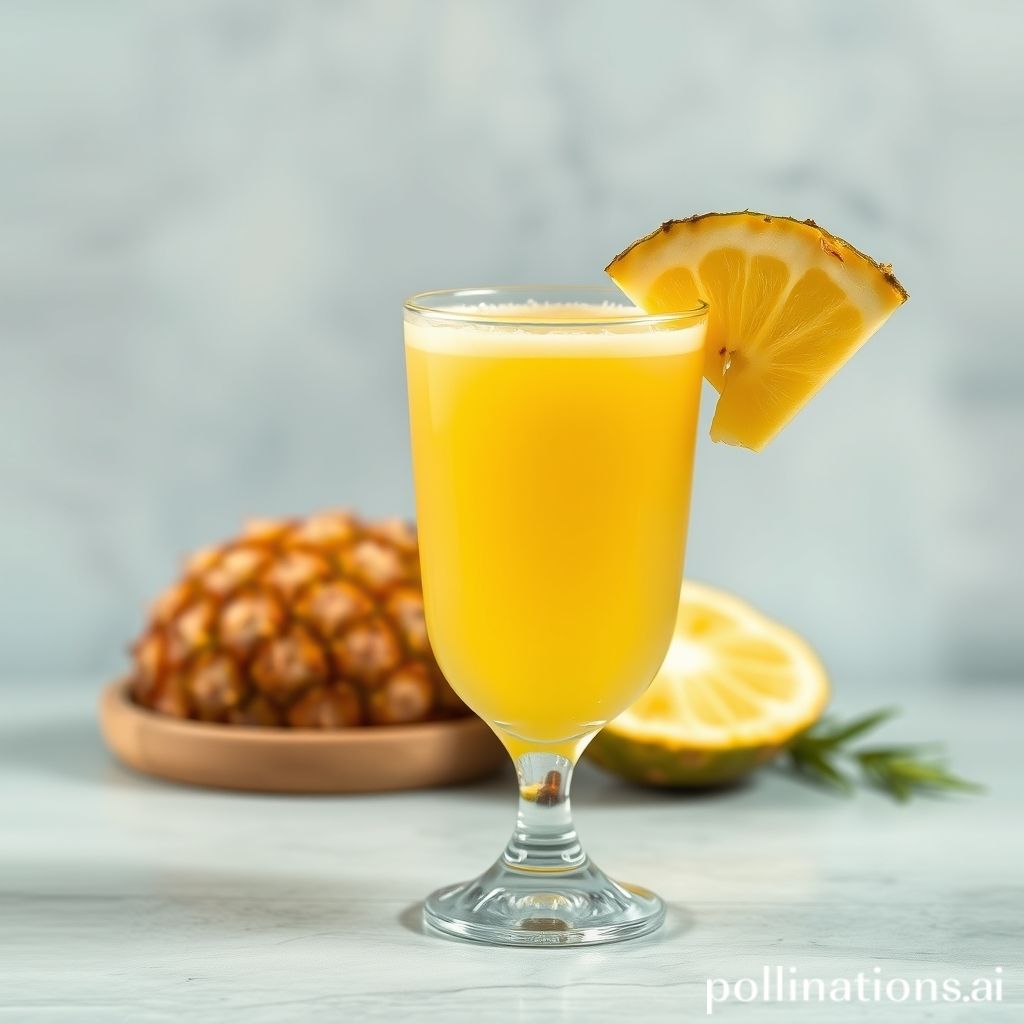Revealing the Truth: Can Pineapple Juice Aid Menstruation?
Pineapple juice has long been praised for its refreshing taste and potential health benefits. Many people wonder if this tropical beverage can also offer relief during menstruation.
In this article, we will explore the potential benefits of pineapple juice for menstruation. From its ability to alleviate menstrual cramps to its potential effects on regulating periods, we will delve into the topic to provide you with a comprehensive understanding. Whether you are seeking natural remedies or simply curious about the effects of pineapple juice on menstruation, this article will equip you with the knowledge you need. So, let’s dive in and explore the potential benefits of pineapple juice for menstruation.

Table of Contents
Menstrual Cramps and Pineapple Juice
1. Can pineapple juice help with menstrual cramps?
Pineapple juice has been suggested to potentially help with menstrual cramps due to its possible anti-inflammatory properties. It contains an enzyme called bromelain, which can reduce pain and inflammation.
Bromelain is believed to work by reducing the production of certain pro-inflammatory substances in the body that can contribute to menstrual cramps. By reducing inflammation, pineapple juice may help lessen the severity of cramps and provide relief during menstruation.
In contrast, it’s important to note that there is limited scientific evidence regarding the direct impact of pineapple juice on menstrual cramps. Whilst some people may find relief from consuming pineapple juice, it may not be effective for everyone. It’s always advisable to consult with a healthcare professional for personalized advice.
2. Other Benefits of Pineapple Juice during Menstruation
In addition to its potential effects on menstrual cramps, pineapple juice may offer other benefits for overall menstrual health. It is a rich source of vitamins and minerals that can support a healthy menstrual cycle.
Pineapple juice contains vitamin C, which has antioxidant properties. Antioxidants can help reduce oxidative stress in the body, which may contribute to menstrual discomfort. Vitamin C also plays a crucial role in collagen synthesis, important for maintaining the health of reproductive tissues.
Furthermore, pineapple juice is a good source of manganese, a mineral involved in the production of sex hormones. Adequate manganese levels may help regulate hormonal balance during menstruation.
Whilst pineapple juice can be a refreshing and nutritious addition to a balanced diet, it’s important to remember that it is not a substitute for medical advice or treatment. If you experience severe menstrual cramps or have any concerns about your menstrual health, it is recommended to consult with a healthcare professional.
Expert Tips: Try pineapple juice for menstrual cramps. It may reduce inflammation and provide relief. Consult a healthcare professional for personalized advice.Regulating Periods with Pineapple Juice
1. Can drinking pineapple juice regulate periods?
- This section examines the claims suggesting that pineapple juice can help regulate menstrual cycles.
- It also discusses the lack of scientific evidence supporting this claim.
2. Factors Affecting Menstrual Regularity
- This section explores other factors that can impact menstrual regularity.
- It emphasizes the importance of a balanced diet, exercise, and stress management for maintaining a healthy menstrual cycle.
| Table: Factors Affecting Menstrual Regularity | |
|---|---|
| Factors | Impact on Menstrual Regularity |
| Diet | A balanced diet rich in essential nutrients supports hormonal balance and regular periods. |
| Exercise | Regular physical activity helps regulate hormones and promotes a healthy menstrual cycle. |
| Stress Management | High levels of stress can disrupt hormonal balance and lead to irregular periods. |
In the course of pineapple juice is often believed to have various health benefits, there is limited scientific evidence specifically linking it to regulating periods. It is important to note that the claims surrounding pineapple juice’s effects on menstruation are largely anecdotal and not supported by rigorous scientific studies.
In contrast, maintaining menstrual regularity is crucial for overall reproductive health. Various factors can influence the regularity of menstrual cycles, including diet, exercise, and stress management. A balanced diet that includes essential nutrients supports hormonal balance and can contribute to regular periods. Regular physical activity helps regulate hormones and promotes a healthy menstrual cycle. Additionally, managing stress levels is important as high levels of stress can disrupt hormonal balance and lead to irregular periods.
It is recommended to focus on a holistic approach to maintain a healthy menstrual cycle rather than relying solely on pineapple juice or any specific food or drink. Consulting with a healthcare professional can provide personalized guidance on maintaining menstrual regularity and addressing any concerns related to menstruation.
How to Incorporate Pineapple Juice into Your Diet
1. Recommended Serving Size of Pineapple Juice
When adding pineapple juice to your diet, it’s important to consume it in moderation. The recommended serving size of pineapple juice is about 1 cup (240ml) per day. This amount provides the benefits of pineapple juice without consuming excessive sugar.
It’s important to note that pineapple juice contains natural sugars, so it’s essential to be mindful of your overall sugar intake. If you have any existing health conditions, such as diabetes, it’s crucial to consult with a healthcare professional before incorporating pineapple juice into your diet.
2. Pineapple Juice Recipes
Incorporating pineapple juice into your meals or enjoying it as a standalone beverage can be a delightful way to reap its benefits. Here are some creative recipes to try:
a. Pineapple Juice Smoothie:
- Ingredients:
- 1 cup pineapple juice
- 1 banana
- 1 cup spinach
- 1/2 cup Greek yogurt
- 1/2 cup almond milk
- 1 tablespoon honey
- Instructions:
- Combine all the ingredients in a blender and blend until smooth.
- Enjoy as a refreshing and nutritious breakfast or snack.
b. Grilled Pineapple Chicken:
- Ingredients:
- 4 boneless, skinless chicken breasts
- 1 cup pineapple juice
- 1/4 cup soy sauce
- 2 tablespoons honey
- 1 tablespoon minced garlic
- 1 teaspoon grated ginger
- Salt and pepper to taste
- Instructions:
- In a bowl, combine pineapple juice, soy sauce, honey, garlic, ginger, salt, and pepper to make a marinade.
- Marinate the chicken breasts in the marinade for at least 30 minutes.
- Preheat the grill and cook the chicken breasts until they reach an internal temperature of 165°F (74°C).
- Serve the grilled chicken with pineapple slices for a flavorful and tropical twist.

Potential Side Effects of Pineapple Juice
1. Allergic Reactions
Some people may experience allergic reactions to pineapple juice, especially if they have known allergies. Pineapple contains an enzyme called bromelain, which can trigger allergic symptoms in susceptible individuals. These symptoms may include:
- Skin rash or hives
- Swelling of the lips, tongue, or throat
- Difficulty breathing
- Upset stomach or nausea
If you have a known allergy to pineapples or other tropical fruits, it is advisable to avoid consuming pineapple juice to prevent potential allergic reactions.
2. Digestive Issues
Consuming large amounts of pineapple juice may cause digestive discomfort for some people. This is primarily due to the high levels of bromelain, which can act as a natural digestive enzyme and potentially cause:
- Stomach cramps
- Diarrhea
- Gas or bloating
If you experience these symptoms after drinking pineapple juice, it is recommended to reduce your intake or consult with a healthcare professional.
Conclusion
Meanwhile pineapple juice offers various potential health benefits, it is important to be aware of the potential side effects. Allergic reactions and digestive issues may occur in certain individuals, especially those with known allergies or sensitivity to bromelain. If you have any concerns or experience adverse effects, it is always advisable to seek medical advice.
| Information |
|---|
| Pineapple juice may cause allergic reactions in individuals with known allergies. |
| Consuming large amounts of pineapple juice can lead to digestive discomfort. |
Scientific Evidence and Expert Opinions
1. Lack of scientific studies
There is a lack of scientific studies specifically focusing on the effects of pineapple juice on menstruation. Whilst pineapple juice contains various vitamins and minerals, its direct impact on menstrual health has not been extensively researched. Despite this, the absence of scientific studies does not necessarily mean that pineapple juice has no effect on menstruation.
Some studies have explored the potential benefits of certain compounds found in pineapple, such as bromelain. Bromelain is an enzyme known for its anti-inflammatory properties, and it has been suggested that it may help alleviate menstrual cramps. Despite this, more research is needed to understand the specific effects of bromelain in relation to menstruation.
2. Expert opinions
Whilst scientific studies may be lacking, healthcare professionals and nutritionists can provide valuable insights based on their expertise and experience. Many experts believe that pineapple juice can have positive effects on menstrual health, although the evidence is anecdotal.
According to some experts, the anti-inflammatory properties of bromelain found in pineapple juice may help reduce inflammation and alleviate menstrual cramps. Additionally, pineapple juice is rich in vitamin C, which can support the immune system and have a positive impact on overall well-being during menstruation.
Despite this, it is important to consult with a healthcare professional or nutritionist before making any significant changes to your diet or using pineapple juice as a remedy for menstrual symptoms. They can provide personalized advice based on your individual health needs and guide you in making informed decisions.
Conclusion
In the course of many people believe that pineapple juice can offer benefits for menstruation, there is a lack of scientific evidence to support these claims. Although pineapple is a nutritious fruit, there is no specific research indicating its effectiveness in alleviating menstrual cramps or regulating periods.
It’s important to approach such remedies with caution and consult with healthcare professionals for appropriate advice. In the course of pineapple juice may be enjoyed for its taste and potential nutritional benefits, it should not be relied upon as a sole solution for menstrual discomfort.
FAQ about Pineapple Juice and Menstruation
FAQ 1: Can pineapple juice lighten menstrual flow?
There is no scientific evidence to suggest that pineapple juice can lighten menstrual flow. Menstrual flow is primarily influenced by hormonal changes in the body.
FAQ 2: Is it safe to consume pineapple juice during menstruation?
Yes, it is safe to consume pineapple juice during menstruation. Pineapple juice is a natural and nutritious beverage that can be included as part of a balanced diet.
FAQ 3: Does pineapple juice help with PMS symptoms?
Whilst pineapple juice may contain certain vitamins and minerals that can support overall health, there is no specific evidence to suggest that it can alleviate PMS symptoms. It is recommended to consult a healthcare professional for appropriate management of PMS.
FAQ 4: Can pineapple juice delay the onset of menstruation?
There is no scientific evidence to support the claim that pineapple juice can delay the onset of menstruation. Menstruation is a natural process regulated by hormonal changes in the body.
FAQ 5: Are there any alternatives to pineapple juice for menstrual cramps?
Yes, there are several alternatives to pineapple juice that may help alleviate menstrual cramps. Some options include ginger tea, chamomile tea, hot water bottles, gentle exercise, and over-the-counter pain relievers. It is advisable to consult a healthcare professional for personalized advice on managing menstrual cramps.
Read Similar Post:
1. Pineapple-Infused Mimosa: Elevate Your Brunch with This Tropical Twist
2. Fizzing Pineapple Delight: The Perfect Cocktail Recipe with Champagne and Pineapple Juice
